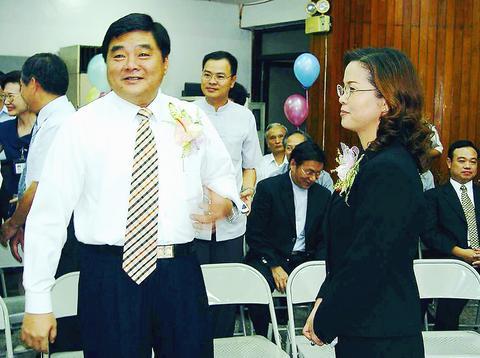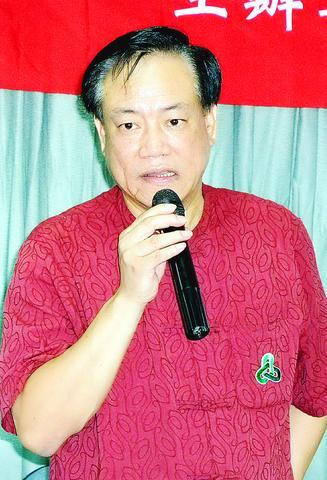Former People First Party (PFP) lawmaker Liu Sung-fan (
Liu is currently in New York and there is no indication he is planning to returning home.

PHOTO: THE TAIPEI TIMES
The former lawmaker, who was Speaker of the Legislative Yuan for the Chinese Nationalist Party (KMT) from 1992 to 1999, is not alone in his voluntary exile -- many politicians and businesspeople facing legal problems have fled the country rather than appear in court or serve time.

PHOTO: THE TAIPEI TIMES
Law enforcement personnel are also looking for former independent legislator Wu Tzer-yuan (
The Ministry of Justice, the Bureau of Investigation and the National Police Agency said that their personnel will carry out their orders to locate and arrest these people -- regardless of politics.
Taipei District Prosecutors' Office Spokesman Chen Hung-ta (陳宏達) said that the law mandates that a convicted person is supposed to report to the local prosecutors' office on time to begin his or her jail term or that person will be declared a fugitive. A person can also be declared a fugitive if he or she fails to appear after three summonses and law enforcement officers cannot locate him or her despite three attempts.
"For their families' and their own good, I would suggest these people face whatever responsibilities they have," Chen said.
Liu and Tseng
On Sept. 7, the Taiwan High Court's Taichung branch sentenced Liu to four years in jail for corruption, declaring a final verdict.
Prosecutors said Liu will be declared a fugitive if he fails to report to the prosecutors' office to begin his jail term. However, since Liu's family has yet received the official High Court verdict, the date Liu's jail term is set to begin is not yet known.
Liu was president of the Bank of Taichung -- later renamed the Taichung Business Bank -- from October 1992 to October 1998, when Tseng replaced him.
Taichung prosecutors alleged in 2001 that Tseng had abused his position as bank president in November 1998 to push through loans worth more than NT$9 billion. They said he also kept dummy accounts in six companies to facilitate his illegal transactions.
According to the Sept. 7 verdict, Liu served as a middleman for Tseng in these activities. The court found Liu conspired with the Chihching Co to conceal one of Tseng's dummy accounts. Chihching, which only had NT$2 million in capital, managed to secure a NT$1.5 billion loan from the Taichung Business Bank and Liu received NT$150 million in kickbacks.
On June 8, Tseng was sentenced to 11 years in jail in this case. But he disappeared with his wife on June 14 and is now thought to be living in Shanghai.
Wu Tzer-yuan
The Panchiao District Court convicted Wu on a raft of corruption and fraud charges in 1996 for his involvement, as a then-KMT member and director of the Taiwan Provincial Government's Planning and Development Department, in a kickback scandal over the 1992 Sipiantou (
In 1997, however, the Taiwan High Court upheld a prosecutor's request that Wu be detained.
In May 1998, Wu was released on bail of NT$3.6 million for medical reasons and banned from leaving the country. Seven months later he was elected as an independent lawmaker for Pingtung County, thereby acquiring the judicial immunity enjoyed by legislators during legislative sessions.
Wu's campaigning for KMT presidential candidate Lien Chan (
Wu won re-election on Dec. 1, 2001, and shortly afterward was named as a leader of a legislative delegation for a trip to Japan. The court granted him temporary permission to leave the country for that trip.
He left Taiwan with the rest of the delegation on Dec. 29, 2001 -- but did not return with the others. His legislative office announced a month later that he had flown to Bangkok. The Bureau of Investigation later said that Wu had been spotted by its special agents in Guangzhou, China.
On Nov. 19, 2002, the Taiwan High Court declared Wu a fugitive after he failed to answer any summons in connection with his appeal of the case.
Chang Jung-wei
The former Yunlin County commissioner is also in serious legal trouble. Yunlin County prosecutors want him for their investigation into the Linnei Township incinerator construction scandal. He faces a 12-month jail term handed down by the Taiwan High Court's Taichung branch on Aug. 26 for his involvement in bribery connected with the 1994 Yunlin County Council speakership election, although he could still appeal the verdict.
Chang's whereabouts have been a mystery since Aug. 13, when prosecutors and Bureau of Investigation's special agents raided his office and residence regarding the investigation of the incinerator scandal. He has been declared a fugitive for failing to respond to Yunlin prosecutors' summonses for three times and three arrest attempts as well.
Law enforcement officers believe Chang fled to China but his family insists that he is still here.
Prosecutors said Chang is in a tight position because all the witnesses' testimony has been against him.
"That is why we need him to tell us his story," said Tsai Chi-wen (
Ho Chih-hui
Ho has been living in Shanghai ever since prosecutors indicted him on charges of corruption, theft and breach of trust and recommended an 18-year sentence on May 7.
Ho never responded to any court summons and was declared a fugitive after missing three hearings and three arrest attempts.
According to the Taipei pro-secutors' indictment, Ho took advantage of his position as Miaoli County commissioner in 1995 to obtain a loan from the Hsinchu Commercial Bank to help fund his wife's legislative campaign.
The bank allegedly gave him a NT$300 million (US$9.09 million) loan despite his lack of credit-worthiness -- a violation of the Securities Transaction Law (證券交易法).
The indictment alleges that in 1997, Ho, in his role as commissioner, illegally pressured his subordinates to approve a construction proposal submitted by Chiu-chun Development Co even though company had failed to provide a complete environmental protection plan for the project. Prosecutors said Ho received a NT$320 million bribe from the company in exchange for his help in getting the proposal approved.
Ho is also alleged to have used his connections in 1999 to obtain a NT$200 million loan from the Kuo Hua Life Insurance Co.

Alain Robert, known as the "French Spider-Man," praised Alex Honnold as exceptionally well-prepared after the US climber completed a free solo ascent of Taipei 101 yesterday. Robert said Honnold's ascent of the 508m-tall skyscraper in just more than one-and-a-half hours without using safety ropes or equipment was a remarkable achievement. "This is my life," he said in an interview conducted in French, adding that he liked the feeling of being "on the edge of danger." The 63-year-old Frenchman climbed Taipei 101 using ropes in December 2004, taking about four hours to reach the top. On a one-to-10 scale of difficulty, Robert said Taipei 101

Nipah virus infection is to be officially listed as a category 5 notifiable infectious disease in Taiwan in March, while clinical treatment guidelines are being formulated, the Centers for Disease Control (CDC) said yesterday. With Nipah infections being reported in other countries and considering its relatively high fatality rate, the centers on Jan. 16 announced that it would be listed as a notifiable infectious disease to bolster the nation’s systematic early warning system and increase public awareness, the CDC said. Bangladesh reported four fatal cases last year in separate districts, with three linked to raw date palm sap consumption, CDC Epidemic Intelligence

US climber Alex Honnold left Taiwan this morning a day after completing a free-solo ascent of Taipei 101, a feat that drew cheers from onlookers and gained widespread international attention. Honnold yesterday scaled the 101-story skyscraper without a rope or safety harness. The climb — the highest urban free-solo ascent ever attempted — took just more than 90 minutes and was streamed live on Netflix. It was covered by major international news outlets including CNN, the New York Times, the Guardian and the Wall Street Journal. As Honnold prepared to leave Taiwan today, he attracted a crowd when he and his wife, Sanni,

Two Taiwanese prosecutors were questioned by Chinese security personnel at their hotel during a trip to China’s Henan Province this month, the Mainland Affairs Council (MAC) said yesterday. The officers had personal information on the prosecutors, including “when they were assigned to their posts, their work locations and job titles,” MAC Deputy Minister and spokesman Liang Wen-chieh (梁文傑) said. On top of asking about their agencies and positions, the officers also questioned the prosecutors about the Cross-Strait Joint Crime-Fighting and Judicial Mutual Assistance Agreement, a pact that serves as the framework for Taiwan-China cooperation on combating crime and providing judicial assistance, Liang